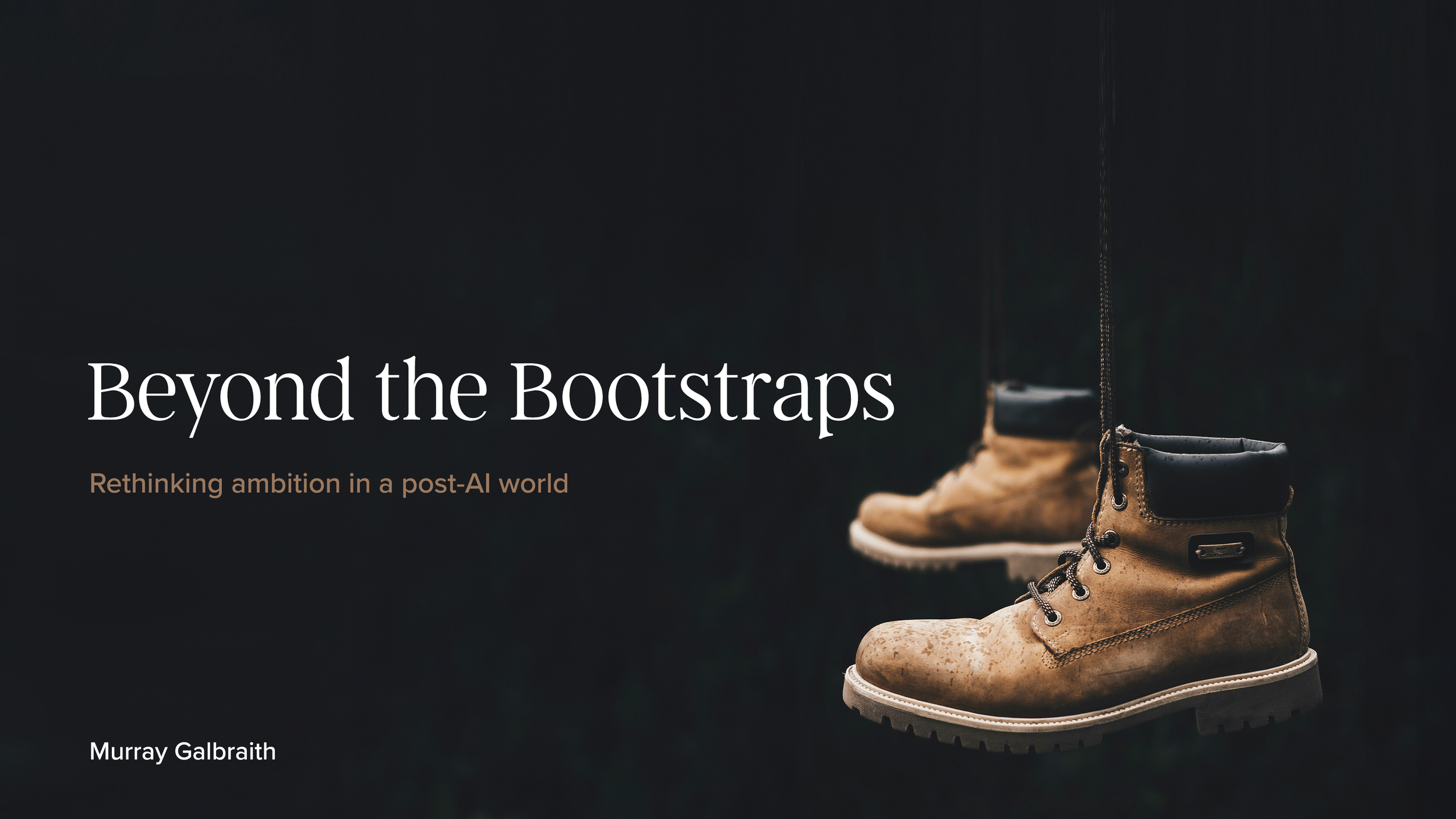Beyond the Bootstraps
I must admit, I’ve never liked the phrase ‘pulled up by the bootstraps’.
Partly because it’s a weird thing to say, but mainly because I have no idea what the hell a bootstrap is.
You know, those mythical straps we're all supposed to pull ourselves up by? The ones conservative politicians always insist we use instead of asking for help?
Well unfortunately, I just learned something about bootstraps… They're just shoelaces.
In 1834, a newspaper published what was meant to be an absurd joke - a character claiming to have "walked into the street, merely by pulling on the straps of my boots."
It turns out, impossibility was the point.
You can't lift yourself up by your own shoelaces.
Yet here we are, 190 years later, still treating this physics-defying metaphor as career advice.
We're told to pull ourselves up by our bootstraps in an economy where, increasingly, the boots come without straps at all.

Can you remember your first job?
Next time you visit a supermarket, take a moment to count the self-checkout machines.
Notice the QR code menus replacing waitstaff.
Watch the automated ticket kiosks where teenagers used to sell movie tickets.
Now imagine losing your job tomorrow.
Of course, you’re probably one of the brilliant people who found a way to squirrel some cash away each week.
You’ve been preparing for a rainy day like this for years, right!?
Well done, champion.
If so, you’ve earned the right to feel sorry for ‘the next generation’ who are yet to be given that same opportunity… But please don’t think this only applies to entry-level workers or young people who are early in their careers.
Unfortunately, the current economy means less and less people have a buffer between their current career position and defaulting on some very large loan payments.
So even if you’re crushing it right now… I hope you can see this is about everyone who might ever need to transition, pivot, or rebuild.
In other words, it's about all of us.

In 2024, driving for Uber means:
Minimum $500 and 2-8 weeks of your time, before you ever charge a fare.
The irony would be delicious if it weren't so devastating:
The very jobs meant to help people get back on their feet now require you to be on your feet financially first.
When Old Metaphors Meet New Realities
Maybe it's time we admitted our metaphors for economic mobility haven't kept pace with economic reality.
Nobody climbs ladders anymore – they navigate complex networks, pivot between opportunities, and adapt to rapidly shifting terrain.
We're not rock climbing; we're doing economic parkour. The path up isn't a straight line or even a ladder – it's a complex web of connections, skills, and timing. Sometimes the next handhold isn't above you at all – it's three feet to the left and requires a leap of faith.
And a quick note for anyone tempted to point out how humanity has dealt with technological disruption before, consider this:
The agricultural revolution took generations. The industrial revolution took decades. AI is making technological leaps that none of it’s creators can explain… First in months and now, in just weeks.
To be perfectly clear: I’m not suggesting we should halt all progress or preserve bullshit jobs.
This is about recognising that many of the systems we’ve created to support career transitions are built around metaphors that no longer serve us.
What if, instead of pretending everyone was just a few shoelace supported pushups from success, we designed policy around the reality of constant adaptation?
What if we stopped treating economic support systems as safety nets and started seeing them as launching pads?
Universal Basic Income isn’t charity.
It's infrastructure for the kind of adaptability modern careers require. Think of it as the steady platform you need when preparing for your next leap, not a hammock for the lazy.
A New Blueprint
Despite my surname, economics isn’t exactly my strong suit. But there’s nothing worse than someone whinging about the current state of affairs, without suggesting some actual improvements.
Here's a few ideas to get us started:
1. Replace our outdated transition support systems with ones that recognise the permanence of career flux
2. Acknowledge that "between jobs" isn't a temporary state but an increasingly common phase of modern careers
3. Design policy around enabling adaptation rather than punishing perceived failure
And yes, upon election or re-election, every politician should still complete a month of mandatory work in entry-level positions relevant to their constituency. Not as a photo op, but as someone whose next meal depends on it.
The question isn't whether we need new metaphors for economic mobility. It's whether we'll create them before the old stories stop making sense entirely.
Because while we're debating the physics of pulling ourselves up by shoelaces, the very concept of starting over is quietly disappearing.
Think you're immune? In an AI-accelerated economy, your next career transition might be your last chance to grab hold of anything at all – bootstraps or otherwise.
Perhaps it's time we stopped pretending everyone just needs a better grip on their bootstraps and started building better ways to help each other up.

